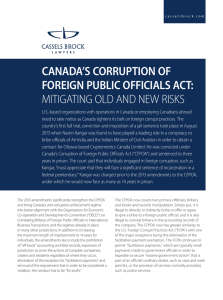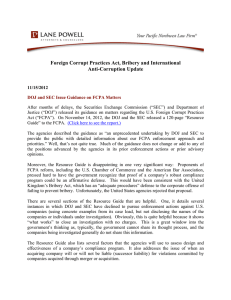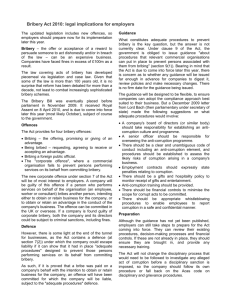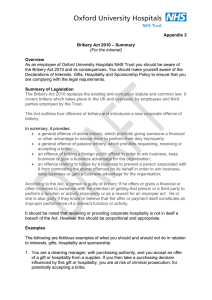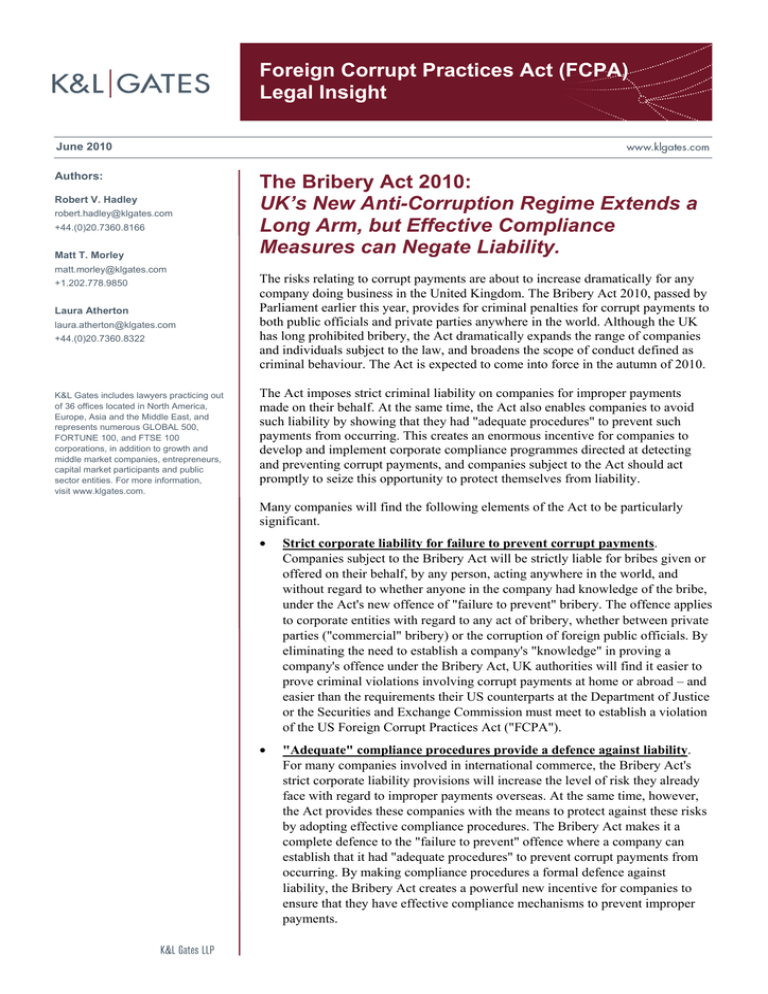
Foreign Corrupt Practices Act (FCPA)
Legal Insight
June 2010
Authors:
Robert V. Hadley
robert.hadley@klgates.com
+44.(0)20.7360.8166
Matt T. Morley
matt.morley@klgates.com
+1.202.778.9850
Laura Atherton
laura.atherton@klgates.com
+44.(0)20.7360.8322
K&L Gates includes lawyers practicing out
of 36 offices located in North America,
Europe, Asia and the Middle East, and
represents numerous GLOBAL 500,
FORTUNE 100, and FTSE 100
corporations, in addition to growth and
middle market companies, entrepreneurs,
capital market participants and public
sector entities. For more information,
visit www.klgates.com.
The Bribery Act 2010:
UK’s New Anti-Corruption Regime Extends a
Long Arm, but Effective Compliance
Measures can Negate Liability.
The risks relating to corrupt payments are about to increase dramatically for any
company doing business in the United Kingdom. The Bribery Act 2010, passed by
Parliament earlier this year, provides for criminal penalties for corrupt payments to
both public officials and private parties anywhere in the world. Although the UK
has long prohibited bribery, the Act dramatically expands the range of companies
and individuals subject to the law, and broadens the scope of conduct defined as
criminal behaviour. The Act is expected to come into force in the autumn of 2010.
The Act imposes strict criminal liability on companies for improper payments
made on their behalf. At the same time, the Act also enables companies to avoid
such liability by showing that they had "adequate procedures" to prevent such
payments from occurring. This creates an enormous incentive for companies to
develop and implement corporate compliance programmes directed at detecting
and preventing corrupt payments, and companies subject to the Act should act
promptly to seize this opportunity to protect themselves from liability.
Many companies will find the following elements of the Act to be particularly
significant.
•
Strict corporate liability for failure to prevent corrupt payments.
Companies subject to the Bribery Act will be strictly liable for bribes given or
offered on their behalf, by any person, acting anywhere in the world, and
without regard to whether anyone in the company had knowledge of the bribe,
under the Act's new offence of "failure to prevent" bribery. The offence applies
to corporate entities with regard to any act of bribery, whether between private
parties ("commercial" bribery) or the corruption of foreign public officials. By
eliminating the need to establish a company's "knowledge" in proving a
company's offence under the Bribery Act, UK authorities will find it easier to
prove criminal violations involving corrupt payments at home or abroad – and
easier than the requirements their US counterparts at the Department of Justice
or the Securities and Exchange Commission must meet to establish a violation
of the US Foreign Corrupt Practices Act ("FCPA").
•
"Adequate" compliance procedures provide a defence against liability.
For many companies involved in international commerce, the Bribery Act's
strict corporate liability provisions will increase the level of risk they already
face with regard to improper payments overseas. At the same time, however,
the Act provides these companies with the means to protect against these risks
by adopting effective compliance procedures. The Bribery Act makes it a
complete defence to the "failure to prevent" offence where a company can
establish that it had "adequate procedures" to prevent corrupt payments from
occurring. By making compliance procedures a formal defence against
liability, the Bribery Act creates a powerful new incentive for companies to
ensure that they have effective compliance mechanisms to prevent improper
payments.
Foreign Corrupt Practices Act (FCPA) Legal Insight
o
•
•
The Act does not specify what will
constitute "adequate procedures," but
instead requires the UK Minister of
Justice to publish guidance on the issue.
This guidance, which is expected shortly,
might be expected to be similar to
guidance that US authorities have been
providing over the past two decades with
respect to compliance with the Foreign
Corrupt Practices Act. In order to permit
companies an opportunity to implement
"adequate procedures," the Act's
provisions on corporate "failure to
prevent bribery" will not come into
effect until 90 days after the publication
of such guidance.
Extraterritorial jurisdiction. The Act
provides for new and expansive jurisdiction
over companies doing business in the UK. Of
course, British companies and citizens are
subject to the Act, which applies to their
conduct anywhere in the world, even with
regard to improper payments having no other
connection to the UK. So too is any
individual who is ordinarily resident in the
UK, whatever his or her nationality or
citizenship. Non-UK companies doing
business in the UK can be prosecuted for
failure to prevent bribery undertaken on their
behalf without regard to where it occurs.
Other non-UK persons can be liable under
the Act, where a portion of the violation
occurs in the UK.
Debarment from EU public contracts.
Businesses found to have violated the Act
will be automatically debarred from
obtaining public contracts from government
entities within the European Union, and UK
authorities have indicated that there will be
exceptions only in the most serious
circumstances, such as a national emergency.
•
Commercial bribery. As noted previously,
the Act prohibits bribery between private
parties as well as the bribery of foreign
public officials, and companies subject to the
Act’s jurisdiction may be prosecuted by UK
authorities for such payments made on their
behalf, no matter where in the world they
occur.
•
Facilitation payments. are not permitted
under the Bribery Act. Although such
payments violated UK law even prior to the
new Act, they are permitted under the FCPA
and the Act’s expanded jurisdiction
provisions will make this prohibition
relevant to many non-UK companies.
•
Gifts and entertainment. The Bribery Act
makes no exception for even modest
corporate hospitality expenditures and the
new offence of bribing a foreign public
official, in particular, is drafted so as
potentially to catch traditional corporate
hospitality. UK authorities have said that
they do not intend to penalise "legitimate
and proportionate use of corporate
hospitality," and that companies should "rely
on prosecutors to differentiate between
legitimate and illegitimate corporate
hospitality." At the same time, they warned
that they will not countenance the use of
"lavish corporate hospitality" as a “bribe to
secure advantages."
•
Money Laundering. Corrupt payments can
raise money laundering issues under the
Proceeds of Crime Act 2002 ("POCA"), in
that revenues relating to business secured by
such payments may be considered to be the
proceeds of criminal activity. Risks of
money laundering violations may arise
where a company knows or suspects that
moneys received under a contract or
otherwise might be the fruits of a Bribery
Act offense. No money laundering offense
arises if the company has the consent
envisaged by POCA, which involves the
reporting of such circumstances to the
Serious and Organised Crime Agency.
Situations that may involve corrupt
payments should be evaluated with POCA
money laundering implications in mind.
•
Re-calibration of FCPA compliance
programs. While the guidance on adequate
procedures is likely to be very similar to
guidance provided by US authorities,
existing FCPA compliance programs may
not necessarily translate into "adequate
procedures" for the purpose of the Bribery
Act, if only because the Act prohibits some
forms of conduct not covered by the FCPA,
and companies with FCPA-based
compliance programs will want to reexamine them in light of the Act.
June 2010
2
Foreign Corrupt Practices Act (FCPA) Legal Insight
For many companies, the Bribery Act creates
new and increased risks, but at the same time, the
Act enables proactive companies to mitigate
those risks substantially by taking some relatively
simple and cost-effective measures in advance. If
a corrupt payment is made by or on behalf of a
company with a UK connection, even a payment
that was unauthorized and unknown, the
company risks prosecution and conviction in
the UK – unless it has already developed and
implemented well-designed, effective anticorruption procedures. Close consideration will
need to be given to the UK Government's
forthcoming guidance on "adequate procedures,"
but it is not too soon for companies to begin to
review their bribery risks and current compliance
programs.
Anchorage Austin Beijing Berlin Boston Charlotte Chicago Dallas Dubai Fort Worth Frankfurt Harrisburg Hong Kong London
Los Angeles Miami Moscow Newark New York Orange County Palo Alto Paris Pittsburgh Portland Raleigh Research Triangle Park
San Diego San Francisco Seattle Shanghai Singapore Spokane/Coeur d’Alene Taipei Tokyo Warsaw Washington, D.C.
K&L Gates includes lawyers practicing out of 36 offices located in North America, Europe, Asia and the Middle East, and represents numerous
GLOBAL 500, FORTUNE 100, and FTSE 100 corporations, in addition to growth and middle market companies, entrepreneurs, capital market
participants and public sector entities. For more information, visit www.klgates.com.
K&L Gates is comprised of multiple affiliated entities: a limited liability partnership with the full name K&L Gates LLP qualified in Delaware and
maintaining offices throughout the United States, in Berlin and Frankfurt, Germany, in Beijing (K&L Gates LLP Beijing Representative Office),
in Dubai, U.A.E., in Shanghai (K&L Gates LLP Shanghai Representative Office), in Tokyo, and in Singapore; a limited liability partnership (also
named K&L Gates LLP) incorporated in England and maintaining offices in London and Paris; a Taiwan general partnership (K&L Gates)
maintaining an office in Taipei; a Hong Kong general partnership (K&L Gates, Solicitors) maintaining an office in Hong Kong; a Polish limited
partnership (K&L Gates Jamka sp. k.) maintaining an office in Warsaw; and a Delaware limited liability company (K&L Gates Holdings, LLC)
maintaining an office in Moscow. K&L Gates maintains appropriate registrations in the jurisdictions in which its offices are located. A list of the
partners or members in each entity is available for inspection at any K&L Gates office.
This publication is for informational purposes and does not contain or convey legal advice. The information herein should not be used or relied
upon in regard to any particular facts or circumstances without first consulting a lawyer.
©2010 K&L Gates LLP. All Rights Reserved.
June 2010
3



